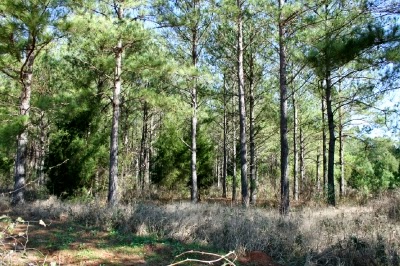 |
| Looking down Union Road from the site of Webbville |
When Marianna was still just a series of wooded hills, a small town was planted in the wilderness about four miles north of present-day Cottondale. Named Webbville after James S. Webb, an early settler and merchant, the community was the business hub for an area of rich lands called the "Chipola Settlement."
Other early settlers of the Webbville area included William S. Pope, Charles F. Stewart, Thomas Baltzell, Ebenezer J. Bower, Thomas Russ, William J. Watson, Joseph Russ and Lackland McIntosh Stone. These men and their families figured prominently in the histories of Marianna, Sneads, St. Joseph and Apalachicola.
 |
| Colonel Stone's well |
Webbville became the first official town in Jackson County when it was incorporated by the Florida Territorial Legislative Council in January 1827. The move was part of an effort to secure a permanent designation as county seat. Settlers were flooding into Jackson County by the thousands and there was a growing need for a permanent county seat.
 |
| Early map showing Webbville, Marianna & Campbellton |
Marianna scored the first blow by obtaining the designation of County Seat from the Territorial Legislature. Webbville struck back by taking the fight to the U.S. Congress, where a House Committee gave the title to Webbville even though the town stood on 16th Section lands reserved for school purposes. The town dealt with this issue by founding the Webbville Academy, Jackson County's first school. The institution was incorporated by the Legislative Council on December 22, 1827.
 |
| 19th century ceramic fragment from site of Webbville |
The battle was far from over. Webbville struck back on February 9, 1832, when the Legislative Council voted to carve off the entire eastern half of Jackson County away as part of a new county. Named Fayette County after the Marquis de Lafayette, the new entity included all of the land between the Chipola and Chattahoochee/Apalachciola Rivers. In Jackson County, the towns of Bascom, Grand Ridge, Greenwood, Malone and Sneads all stand on lands that were once part of Fayette County. The move was intended to remove Marianna's most vocal supporters in time for a referendum on which town would become the permanent county seat.
 |
| Site of Webbville |
Webbville ultimately lost its fight with Marianna, but without really losing it. In the eyes of the U.S. Congress, the town that no longer exists is still the legal county seat of Jackson County. The decision of the Territorial Council to fine public officials that refused to conduct business from the courthouse in Marianna had its desired impact. The courthouse remains there today on the square donated by Robert and Anna Maria Beveridge.
 |
| Piece of a broken wine bottle exposed by erosion |
The site of Webbville is now just a place where Union Road crosses a hilltop as it leads from State Highway 73 north to County Road 162. To find it, turn from Highway 73 onto Union Road and drive to the top of the hill that you see ahead of you. At that spot you will be sitting in what was the main business district of the Town of Webbville.
 |
| Mission San Nicolas interpretive panel near site of Webbville. |
To learn more about Webbville and the early history of Jackson County, please consider my book:
(Kindle E-Book) The History of Jackson County, Florida: The Early Years
It is also available at The Vintage Depot in the restored L&N Train Depot at 2867 Caledonia Street, Marianna, Florida. They are open Monday-Saturday, so drop in for a visit!
1 comment:
Ebenezer J. Bower was my 3rd great grandfather and I had always wondered why his will that was probated in 1836 had Webbville listed on it. I had always heard he died in Marianna. one of his sons George McIntosh Troup Bower(my 2nd great grandfather) moved from there to near Covinton Georgia in about 1842 to attend Oxford(later Emory) college and remained there in Newton Co. Georgia.My Great grandfater,Augustus Rudolphus bower and grandfater Cecil Emory Bower also grew up in Covington.Thanks for the article.
Allen Ebenezer Bower,Jr.
Oconee Co. Georgia
Post a Comment